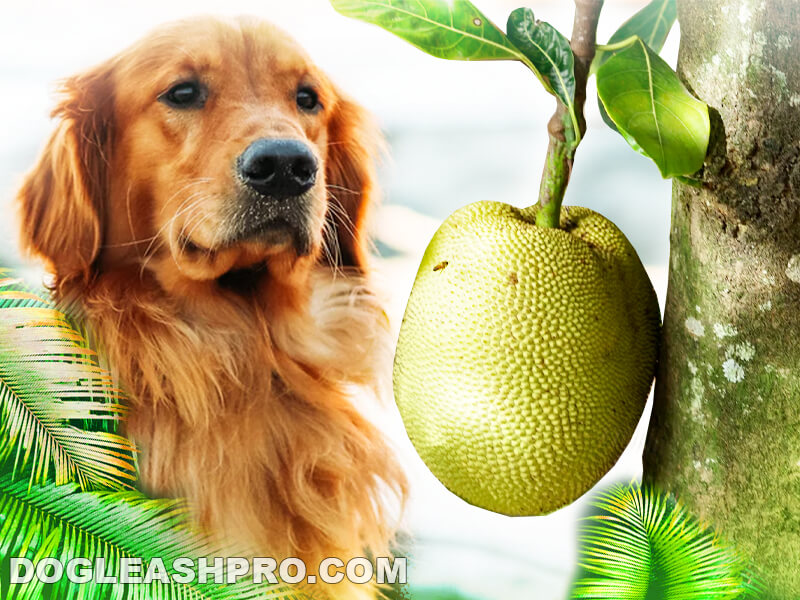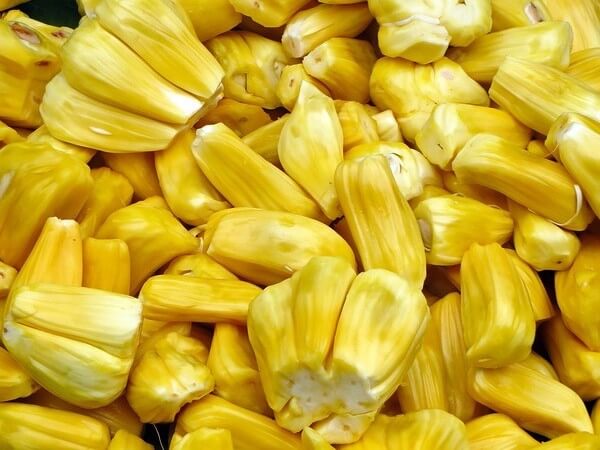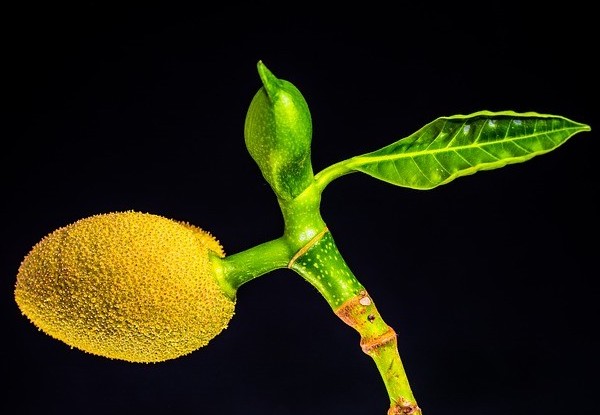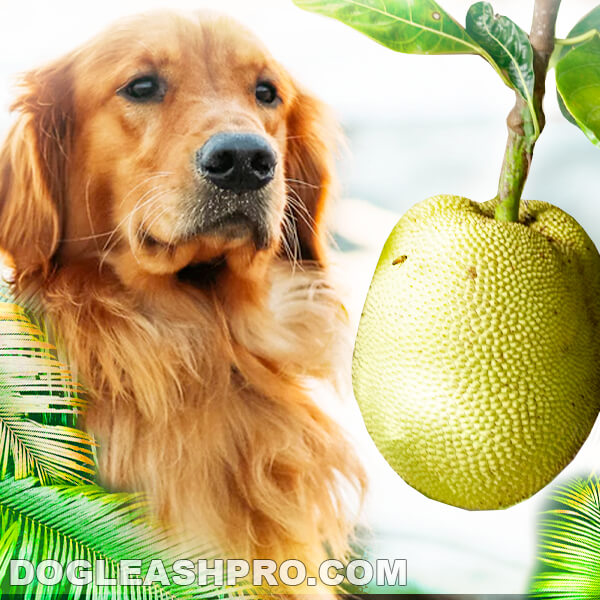
Last week, we decided to make pulled pork sandwiches using Jackfruit. We heard that Jackfruit closely resembles pulled pork and is a great meat alternative for vegetarians, vegans, or anyone who wants to live a healthier lifestyle. Since the Jackfruit looked like meat, our dogs wanted some, but can dogs eat Jackfruit? Let’s find out!
Can dogs eat Jackfruit? No, dogs should not eat Jackfruit. While Jackfruit is common in India and Sub-Saharan Africa for thousands of years, this exotic superfood is still relatively new in the US and UK so there’s limited information and studies on how Jackfruit can affect our dogs.
This is why we recommend that dog owners avoid feeding their canine friends Jackfruit for now until there is a more in-depth research on the safety or dangers of Jackfruit for our dogs. Let’s take a closer look at this fruit to fully understand what may happen if dogs eat Jackfruit.
Table of Contents
Can dogs have Jackfruit?

There are very limited studies on whether dogs can have Jackfruit. However, we’ll take a look at both sides of whether Jackfruit is safe for doggy consumption and provide you with all the information you need to make the best decision for your furry friends.
What is Jackfruit?
Jackfruit belongs to the Morocae family so it is related to the figs, mulberries, and breadfruits. It is the largest fruit to grow on a tree and it can be as heavy as 110 pounds.
Originated from Sri Lanka and India, the Jackfruit was one of their main fruits for thousands of years and was grown for human consumption. It can also be found in Myanmar and Malaysia. Today, the exotic fruit can be grown in tropical areas such as Brazil, central and eastern Africa, and a few southern parts of the US such as Florida and in Hawaii.
Jackfruit has a bumpy texture and appears to be yellow or green when it is ripe. Ripe Jackfruit is fruity in taste and very sweet. But beware, this superfruit has a foul smell.
Many love using Jackfruit in their dishes. The tropical fruit can be eaten in various ways including cooked, dried, fried, canned, and candied. You can find Jackfruit in dishes such as sandwiches, desserts, noodles, and curries. Jackfruit can be used as jams, sauces, flour, chips, or beverages.
Fun Fact: When pomelo is ripe, it also turns yellow. It weighs 2 to 4 pounds and has a pretty sweet flavor with a lemony taste. Pomelo is also rich in minerals, vitamins, and fiber. Check out Can Dogs Eat Pomelo? to find out if pomelo is safe for doggy consumption.
Many vegans and vegetarians love unripe Jackfruit because its taste is similar to that of pork. In fact, Jackfruit is used as a meat alternative.
What’s great about Jackfruit is that it is also a gluten-free alternative to wheat. There are researchers who explained how Jackfruits can help to prevent hunger in the near future since this fruit can replace corns or other grain products that may be affected by climate change.
As a matter of fact, just one Jackfruit can feed a whole family as the tropical fruit provides vital nutrients that are key to health and wellness.
Best of all, Jackfruit is easy to grow and the evergreen tree called Artocarpus heterophyllus that grows the fruit requires very little maintenance. This tree has a dense treetop and a short trunk and can be as tall as 66 feet.
The Jackfruit tree is also versatile. Every part of the tree can be used for good purposes. For instance, humans can eat the Jackfruit as fruit or food, livestock like cattle, sheep, pigs, or horses can eat the nutritious leaves, the root can be used as medicine, and the branches and trees can be used as high-quality wood.
Is Jackfruit good for dogs?
Jackfruit is known to provide many health benefits to humans, however, there’s limited research and study on how it may help our furry friends.
It’s important to mention that just because a fruit is good for human consumption does not always mean that it is good for our canine pals.
Jackfruits include the following vitamin and minerals:
- Vitamin A helps promote healthy and smooth hair and skin and prevent the effects of aging.
- Vitamin C is an antioxidant that neutralizes free radicals, helps improve the immune system, and prevents certain types of cancer.
- Potassium reduces high blood pressure which will help to prevent heart attack or stroke.
- Magnesium promotes healthy and strong bones.
- High in fiber is great for a healthy well-functioning digestive system.
- Low in calories. Just half a cup of Jackfruit has only 90 calories. Half a cup of rice contains more than 90 calories.
- High water content and low sugar and sodium content. Jackfruit is high in water and low in both sodium and sugar. This is great for those who are undergoing weight loss.
As you can see, Jackfruit is nutrient-dense, meaning it is full of nutrients and low in calories.
Fun Fact: Most fruits and vegetables that are nutrient-rich are good for dogs. One such vegetable that is rich in nutrients is Jicama. This vegetable is high in fiber, potassium, and vitamin C so Can Dogs Eat Jicama? Find out!
Is Jackfruit safe for dogs?

While there are many nutritional benefits of Jackfruit for humans, there’s not enough research or studies to prove whether Jackfruit is safe for doggy consumption.
Therefore, we highly recommend that dog owners be extra cautious before feeding their pooch Jackfruit. It’s best to consult with your dog’s vet and seek their advice.
As with any new food that you are introducing to your four-legged friends, the best practice is to give them just a small piece and see how they react to the food. If they react horribly to the food, then you’ll know not to feed that particular food to your dogs again. Again, it’s best to ask your vet first before doing so.
Let’s take a look at some side effects it can have on humans and any potential risks the tropical fruit can have on dogs.
Since Jackfruit contains birch pollen, it can cause allergies in some people. Based on this information, we highly recommend that dogs with allergy sensitivities should avoid consuming Jackfruit.
Jackfruit can also affect those with diabetes because it can affect their glucose tolerance levels. With that in mind, if your furry friends also have diabetes, avoid feeding them Jackfruit.
However, there’s evidence that Jackfruit may be safe for dogs. The closest cousin to Jackfruit is mulberry and mulberry is considered safe for doggy consumption.
In many countries where Jackfruit is grown, many while animals have eaten fallen ripe Jackfruit and were fine.
Fun Fact: Another fruit that contains birch pollen is plum. But are plums safe for dogs to eat? Check out Can Dogs Eat Plums? to find out!
Is Jackfruit bad for dogs?
Jackfruit can be bad for dogs, especially if your canine family members eat the rind of the Jackfruit. That’s because the rind of this tropical fruit is spikey, hard, and thick. This can affect their teeth and can be difficult to swallow.
The rind of the Jackfruit can cause choking in dogs since it is hard to chew into pieces. If your K9 pals do manage to swallow it, the rind of the Jackfruit can cause intestinal blockage, which becomes a serious issue and will require immediate attention and action.
Symptoms you can expect to see includes:
- Diarrhea.
- Vomiting.
- Loss of appetite.
- Abdominal pain due to intestinal blockage.
- Lack of bowel movement or difficulty pooping.
If you notice any of these symptoms or you suspect that your dog has swallowed the rind of the Jackfruit, make sure to contact your dog’s vet immediately. If the intestinal blockage is left untreated, there can be serious health consequences.
As you know, many dogs do not chew their food when they eat. Most dogs will swallow their food, which is why the rind of the Jackfruit can be dangerous for dogs.
If you would still like to feed your furry pooch Jackfruit, be sure to remove the rind and only allow him or her to eat the meat or flesh of the Jackfruit.
Dog ate Jackfruit seed! Can dogs eat Jackfruit seed?
Watch out for those Jackfruit seeds! There are about 300 to 500 seeds in one Jackfruit.
These Jackfruit seeds require proper preparation before consumption. Before we can safely eat the Jackfruit seeds, they need to be roasted or boiled first.
Raw Jackfruit seeds are a no-no because they are poisonous and it is very dangerous to eat raw Jackfruit seeds.
Dogs should avoid eating raw Jackfruit seeds because they can be a choking hazard. That’s because the size of Jackfruit seeds is about the size of a Brazil nut which can get stuck in the dog’s throat or esophagus. If swallowed, it can get stuck in the dog’s intestines and may require expensive emergency surgery. This is especially true for smaller dog breeds like Chihuahuas, Pomeranians, or Cavalier King Charles Spaniel.
In general, the seeds of most fruits are harmful to dogs so it’s best to keep seeds and pits away from our four-legged friends.
For safety, avoid feeding the Jackfruit seeds to dogs, whether they are cooked or raw.
If your pooch rummaged through the trash can and ate the Jackfruit seeds, call your vet right away. Immediate attention is required in this situation.
Your pooch may experience the following symptoms if they accidentally ate the Jackfruit seeds:
- Not able to poop.
- Vomiting as the body will naturally try to get rid of the toxic food.
- Loss of appetite.
Another close cousin of Jackfruit is the fig and it has been shown that some dogs are allergic to figs. Dogs can get mild symptoms from it. So this shows that we need to consider each fruit individually to see if it is safe for dogs to eat.
Is Jackfruit ok for dogs?
From our research findings, the flesh or meat of the Jackfruit is ok for dogs to eat. However, it’s important to note that there is a grayish-white substance that surrounds the flesh of the Jackfruit called latex.
If you know your canine friends are allergic to latex or are sensitive to latex, avoid feeding them Jackfruit. Accidentally consuming Jackfruit if your pooch has a latex allergy can be very harmful to dogs. For safety measures, please avoid giving Jackfruit to dogs with skin allergies such as eczema as well.
If your dogs do not have a latex allergy, then you’ll want to peel off the grayish-white substance from the flesh before feeding it to them. As with other new food, it’s best to consult with your vet first before feeding Jackfruit to your pooch.
As mentioned before, if this is your dog’s first time eating Jackfruit, make sure to only feed him a small piece and then watch for any allergic reactions over the next 12 to 24 hours. If your furry family member reacts by vomiting, having diarrhea, bloating, or passing gas, then it’s best not to feed them Jackfruit anymore.
So, Can Dogs Eat Jackfruit?
Since Jackfruit is a new superfood in the US and UK, there hasn’t been much research or study done on whether it is safe for dogs to eat. For this reason, we highly recommend that you always speak with your veterinarian first and seek their professional advice on whether Jackfruit is safe for your dogs to eat.
Each dog is different and some dogs may be more sensitive to Jackfruit than others. Your vet knows your canine friends best and they can help you determine whether your dog can eat Jackfruit.
We wrote this article in the hope to provide you with all the information you need to know more about this exotic fruit, the health benefits it contains to humans as well as any what to be aware of so that you can make the best decision for your pooch.
While we can not positively say for sure that the Jackfruit is 100% safe for dogs, there are some things dog owners need to be aware of such that the seeds, rind, and latex in the Jackfruit can potentially be harmful and dangerous to dogs.
As responsible dog owners, we always put our dog’s health, safety, and well-being first so before you give that Jackfruit flesh to your pooch, be sure to consult with your vet first.
DISCLAIMER: THIS WEBSITE DOES NOT PROVIDE MEDICAL ADVICE
The information, including but not limited to, text, graphics, images and other material contained on this website are for informational purposes only. No material on this site is intended to be a substitute for professional veterinary advice, diagnosis, or treatment. Always seek the advice of your veterinarian or other qualified health care provider with any questions you may have regarding dietary needs.
Resources:
https://en.wikipedia.org/wiki/Jackfruit
https://hort.purdue.edu/newcrop/morton/jackfruit_ars.html

With over five years of specialized experience as an animal writer, my expertise lies in dog nutrition, health, behavior, grooming, and training. I am dedicated to delivering helpful and informative content that caters to the well-being of our furry friends. My primary goal is to empower pet owners with knowledge and ensure our canine companions thrive in health and happiness. In my free time, I love volunteering at local dog rescue centers.







